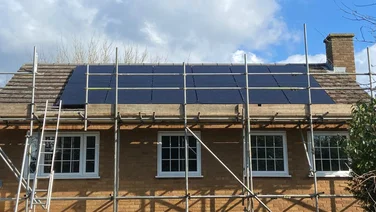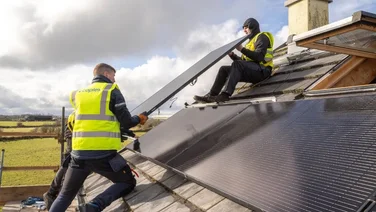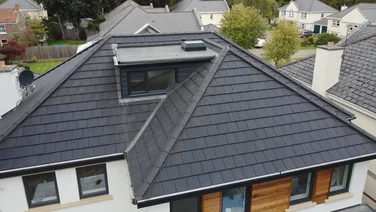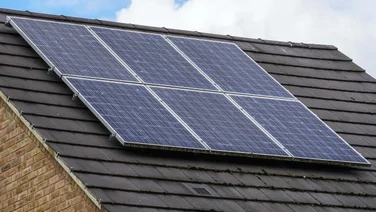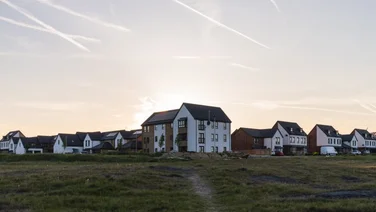- What are folding solar panels?
- What are folding solar panels used for?
- How do folding solar panels connect to your appliances?
- How much do folding solar panels cost?
- Pros and cons of folding solar panels
- How efficient are folding solar panels?
- How much power do folding solar panels produce?
- How big are folding solar panels?
- Are folding solar panels right for you?
- Summary
- Folding solar panels are designed to generate solar power on the go
- They are flexible enough to cover a range of different user needs
- Folding solar panels offer an accessible and ever more powerful solar option
Want to benefit from solar energy but don’t have space for panels on your roof? Foldable panels might be the best option for you. And by placing them at the right angle and direction, you can break even on the whatever type of the solar panels you choose.
Solar panel technology is advancing fast, and now there is a wide range of folding solar panel equipment available designed to travel with you, so you can access free, green electricity wherever you are, and whatever your needs.
Solar panels all run using the same technology, so even smaller, more affordable products will work in the same way as larger panels. Having said that, the smaller the panels, the less energy it is likely to generate. However, advances in solar panel technology mean that this is improving all the time.
You can fill in our quick form, and we’ll pass your details on to professional solar panel installers, who’ll contact you with tailored quotes.
Where do you want to install solar panels?
Get started
What are folding solar panels?
Folding solar panels, like all solar panels, convert sunlight into electricity (more cleverly known as ‘the photovoltaic effect’).
Folding solar panels are made by layering thin slices of silicon attached to an underlying layer of metal, plastic or glass, which then allows for folding.
The silicon used in foldable solar panels is usually one of the following:
- Monocrystalline (efficient but expensive)
- Polycrystalline (less efficient but more affordable)
- Thin film (most affordable but least efficient)
Folding solar panels range enormously in size. Some can fit into a wallet, others are designed to sit on the ground, perhaps outside a tent, or on a motorhome roof.
Folding solar panels are often confused with flexible solar panels, however, the key difference is that while flexible solar panels are able to be bent to fit different shapes, foldable solar panels are rigid. The material the panels are mounted on can be folded for storage or unfolded for use, but the shape of the panels themselves cannot be changed.
There is a wide range of portable, foldable solar panels designed specifically for use with caravans. The best one for you will depend on your budget, your energy needs and your portability requirements.
Head to our page Types of Solar Panels: Which Is Best For You? to learn more.
What are folding solar panels used for?
The flexibility of folding panels – both in terms of size, the weight of materials, and the ability to fold them away when not needed – means they are perfect for intermittent outdoor use.
Typically, they are used for almost any activity when you are off-grid and on the go, be it hiking, camping, boating, kayaking, or for an RV or campervan.
Smaller folding solar panels are generally used for charging smaller devices, such as laptops or mobile phones, GPS, Bluetooth or cameras. However, large-scale folding panels can power anything from air conditioning units to campervans.
And, while they generally aren’t recommended for installation in homes, foldable solar panels can be an option for use on roofs that aren’t able to take the weight of larger rigid solar panels.
Other than on the go, you can also use folding solar panels on the balcony, or in the garden.
Where do you want to install solar panels?
Get startedHow do folding solar panels connect to your appliances?
Some folding solar panels come with USB-C and USB-A ports. This may mean that you are able to charge a small device directly, but it isn’t always the case, and if the panel doesn’t have a charge controller, you may get battery damage.
Folding solar panels without a USB-C or USB-A port is likely to require the use of a rechargeable power station or power bank. Devices are usually connected to these via a micro-USB.
How much do folding solar panels cost?
| Size | Wattage | Costs |
|---|---|---|
Small | 4.5-150 | from £3 |
Medium | 160-300 | from £200 |
Large | 300< | from £400 |
Want to compare these figures to the price of standard solar panels? Head to our solar panel costs page.
Pros and cons of folding solar panels
It’s always a good idea to mull over the pros and cons of solar panels before investing. So before you get yourself a set of foldable solar panels, check out our breakdown of their advantages and disadvantages below.
- Flexibility of use
- Easy to carry
- Easy to install
- Affordable
- Low emissions
- Less efficient
- Less durable
- Vulnerable to weather/water damage
- Vulnerable to user damage
Advantages of foldable solar panels
Folding solar panels lend themselves to so many different uses, so you are likely to be able to re-use them in multiple situations. No matter which size you pick, the panels have been designed to be transported and are very easy to set up, offering a cost-effective but green alternative to other portable energy sources.
Disadvantages of foldable solar panels
Folding solar panels tend to be less efficient than larger, fixed domestic versions (more on this below), however, panel efficiency is improving all the time. Additionally, some may not be waterproof, but again, newer models are increasingly designed to combat this. The nature of how they are built and used means they are inevitably more vulnerable to damage than larger, fixed models, and subsequently less durable.
How efficient are folding solar panels?
Traditionally, folding solar panels tended to be less efficient than rigid panels, typically offering a conversion efficiency rating of only 7-15%.
However, recently this has greatly improved, and you can find many folding solar panels with an efficiency rating of just over 24% – similar to some of the most efficient solar panels on the market.
Look for folding panels that are also designed to avoid overheating, which can impact efficiency.
How much power do folding solar panels produce?
Unsurprisingly, power varies enormously depending on size: the smallest, wallet-size models currently offer under 5 watts, which may be enough to power a smartphone.
But, as with efficiency, solar capacity (the peak amount of electricity generated in optimum conditions) is increasing fast. Some current models offer as much as 400 watts. This is comparable to industry standards for residential rigid solar panels.
How big are folding solar panels?
Folding solar panels can vary greatly in size and weight, from the size of a wallet to the largest, most powerful models, which are designed as backup generators for home power cuts or to power multiple units on the go.
Sample model range from 19 x 11 x 4 cm and 150 Grams, to an unfolded 54 x 232 x 2.4 cm, and 19.5kg.
As you would expect, folding solar panel design is evolving all the time, and panels are becoming increasingly compact and easy to carry.
Are folding solar panels right for you?
Key questions to ask yourself before investing in foldable solar panels include:
- Where will you use them? – Are they built in a way that is suitable for the activity you have in mind? If you intend to use them on a boat, are they waterproof, for example?
- Will they be easy enough for you to transport? – Some fit into your backpack, others are designed for a car boot. Weights vary dramatically. Is the model you’re looking at easy for you to take with you where you need it to go?
- What wattage do you need? – Will they provide enough power for all the devices you require? Are you looking to power small devices (tablets, smartphones, etc), or your entire motorhome?
- How long do portable solar panels last? – Assuming they are quality panels and haven’t been damaged, industry research has revealed that most portable solar panel owners use them for up to 25 years. Efficiency may decrease slightly during this time span.
Summary
If you’re looking for a green, cost-effective energy source to power you when you are off-grid and on the go, foldable solar panels offer a flexible and increasingly efficient solution.
With a vast range of sizes and weights, it’s increasingly easy to find the right model to suit your needs.
Think regular solar panels might be a better fit for you? We can help. Just fill in our short form, and we’ll pass your details on to our network of solar panel installers who will get in touch with their best prices.


